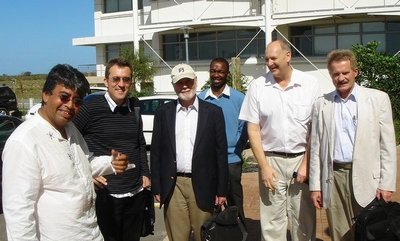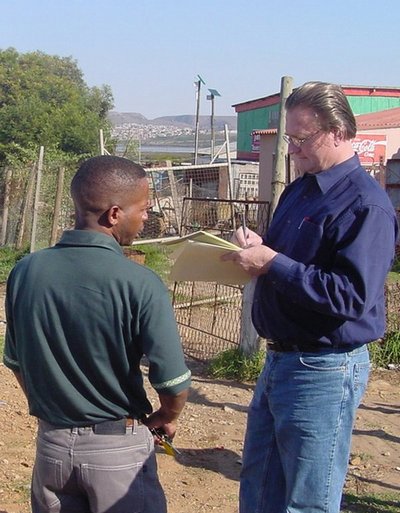April 30, 2009
UW Marine Affairs faculty help South African university start a maritime studies program
With 500 miles of nearly pristine coastline, the Eastern Cape of South Africa is known for its splendid beaches including Jeffreys Bay, considered one of the five most famous surfing destinations in the world. There, if conditions are just right, one can ride a single wave for more than half a mile.
While rich in both marine and terrestrial resources, especially wildlife and great scenic beauty, the Eastern Cape remains one of the country’s poorest regions with 40 percent unemployment.
Government officials believe one remedy is to take greater advantage of the area’s marine and coastal assets via its ports, fisheries, tourism and other maritime activities.
To train leaders and managers in those areas — as well as environmental specialists so resources are managed sustainably — Nelson Mandela Metropolitan University sought advice from the UW’s School of Marine Affairs.
And so, when Nelson Mandela Metropolitan University debuted its first-ever degree program in maritime studies in February, UW’s Vlad Kaczynski and Tom Leschine were there for the ceremonies and to give inaugural short courses. Subsequently, another School of Marine Affairs colleague Marc Miller taught a third short course this spring.
“Before this, there was no sort of maritime training in this important province with two ports, fisheries, coastal transportation issues and such,” says Kaczynski, a retired associate professor of marine affairs. Initially an undergraduate degree is being offered but a master’s program is planned to start next year and a doctoral program the year after that. Advanced training for professionals already in the field and joint research is also being planned.
“Nelson Mandela Metropolitan University has excellent facilities and the maritime studies program could serve as a bridge to the rest of Africa, with other countries sending their students, professionals and executives for training,” he says.
Ports are one place where well-trained managers can make a difference by being able to increase traffic, weigh environmental impacts of port development and improve security, Kaczynski says. Improved port security for U.S. ships or ships destined for the United States is one example of how U.S. interests benefit from the cooperation between UW and Nelson Mandela Metropolitan University.
Maritime studies graduates could also help develop coastal tourism in sustainable ways. The country already has a long tradition of animal parks, national parks and eco- and ethnic-tourism, says Miller, a professor of marine affairs specializing in the management of living marine resources for such things as recreation. To help communities select the kinds of tourism that builds on that existing reputation, Miller says maritime studies graduates might become resource managers, launch their own private eco-tourism businesses or work for non-governmental environmental groups.
The collaboration doesn’t just benefit South African students, it also benefits UW students by giving them an international perspective, Kaczynski says. “If we don’t care about their problems, then those problems get exported here,” he says citing, for example, how much more difficult it is to control diseases like Ebola when countries are poor.
UW faculty say they also feel that the opportunity to travel and incorporate those experiences into their courses is important.
“Teaching there has enriched my base of understanding for teaching policy at UW,” says Leschine, who is director of the School of Marine Affairs. “For example, to see how fisheries policy in South Africa is a tool of social reform first and stock conservation second, while here it’s been all about the stocks with comparatively less regard for the social implications of policy shifts.”
School of Marine Affairs involvement in maritime studies in South Africa dates from 2001 when UW arranged for a group of nursing, education and marine affairs faculty to visit there. Ever since, marine affairs faculty have been traveling, teaching and helping Nelson Mandela faculty members conceptualize the maritime studies program. The UW work has been funded by the UW, National Oceanographic and Atmospheric Administration and the USDA Agency for International Development.
“I share the confidence of Department of Development Studies Head Richard Haines that this year’s modest beginning will mature into a program of lasting value to South Africa’s on-going development transformation,” Leschine says.


